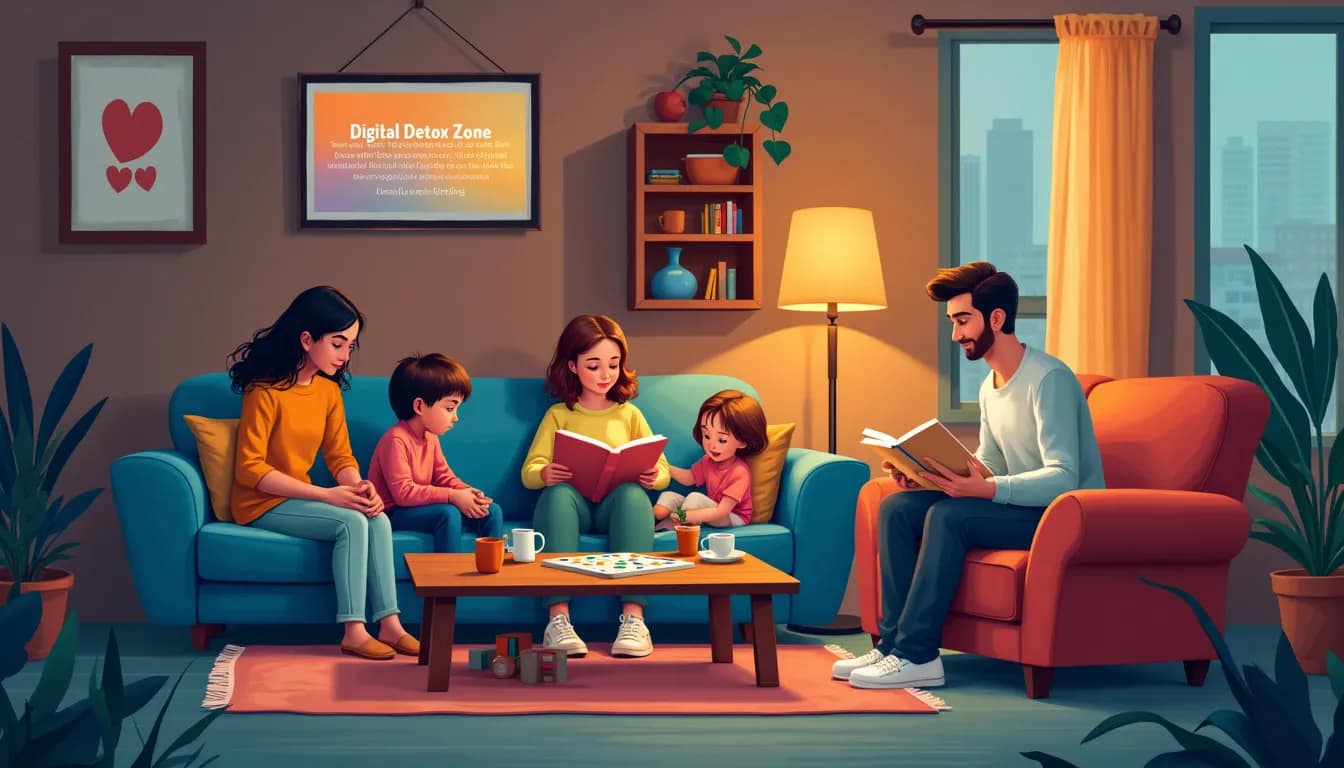In today’s fast-paced world, the constant bombardment of notifications, emails, and social media can leave us feeling overwhelmed and mentally drained. This is where the concept of a digital detox comes into play—a dedicated period of time when we intentionally refrain from using electronic devices to reduce stress and focus on other aspects of life. As technology continues to weave itself deeper into our everyday routines, many of us underestimate the significant impact it has on our mental well-being.
Statistics show that the average person spends several hours a day on their smartphone, often leading to increased levels of anxiety and depression. It’s not just the time spent on devices, but also the nature of the content we consume and the way constant connectivity affects our brain. Entering a digital detox can provide a much-needed break and allow our minds to reset, recharge, and re-connect with the present moment. Studies have highlighted various mental health benefits associated with reducing screen time, like lower stress levels, improved sleep quality, and enhanced productivity.
Through this article, we aim to explore the mental health benefits that a digital detox can bring and offer practical steps to help you embark on this journey. Whether you’re looking to reduce anxiety, sleep better, or simply reclaim your focus, taking the time for a digital detox can be a transformative experience. So, let’s take a moment to breathe, step back from our screens, and discover the peaceful clarity that awaits us beyond the digital world.
Introduction to Digital Detox and Its Importance for Mental Health
Definition of Digital Detox
In today’s digital age, we are constantly surrounded by screens—from smartphones and tablets to computers and televisions. A digital detox refers to a period of time during which an individual refrains from using electronic devices such as smartphones, computers, and social media platforms. The purpose of a digital detox is to reduce stress, improve mental well-being, and foster a more balanced lifestyle.
Overview of the Prevalence of Technology Use
Modern technologies have seamlessly integrated into every aspect of our lives. We use them for work, communication, entertainment, and even for managing our daily tasks. According to recent studies, the average person spends more than three hours a day on their smartphone. While technology offers numerous benefits, this constant connectivity comes with its own set of challenges, particularly for our mental health.
Brief Introduction to the Mental Health Benefits
Engaging in a digital detox can provide profound benefits for your mental health. Stepping away from our screens allows us to regroup, reconnect with ourselves, and revitalize our mental well-being. Studies suggest that reducing screen time can significantly reduce anxiety and stress levels, improve sleep quality, and boost focus and productivity. By incorporating mindful practices such as a digital detox, we can foster healthier mental habits and attain a greater sense of peace and balance in our lives.
Interactive Reflection: Assessing Your Technology Use
Take a moment to reflect on your own technology use. You might want to consider the following questions:
- How much time do you spend on screens daily?
- Do you feel anxious or stressed when you cannot access your devices?
- How often do you engage in face-to-face interactions without the interruption of technology?
Jot down your thoughts and observations. Recognizing your current habits is the first step towards making mindful changes.
Personal Story: Finding Balance Through a Digital Detox
Emily, a 29-year-old marketing professional, found herself constantly tethered to her smartphone, even outside of work hours. The relentless notifications and the pressure to respond immediately began to take a toll on her mental health. She often felt overwhelmed and struggled to sleep at night.
I decided to try a digital detox after reading about its benefits, Emily shares. I started small by setting aside my phone during meals and gradually extended the time I spent away from screens. The results were astonishing. I felt less anxious and more present in the moment. My sleep improved, and I even picked up some new hobbies. It’s been a game-changer for my well-being.
Encouragement to Begin Your Own Digital Detox
If you’re feeling the strain of constant digital engagement, consider taking the first step towards your own digital detox. Remember, it’s not about completely eliminating technology, but rather finding a healthy balance that supports your mental health. Small changes can lead to significant improvements, helping you lead a more mindful, connected, and fulfilling life.
Key Mental Health Benefits of a Digital Detox
Reduced Anxiety and Stress Levels
One of the most compelling reasons to consider a digital detox is the dramatic reduction in anxiety and stress levels. Constantly being connected, whether it’s through emails, social media, or news updates, can create an ongoing sense of urgency and overwhelm. According to a study published in the journal Computers in Human Behavior, frequent use of digital devices is strongly correlated with higher levels of stress.
Imagine the liberation of stepping away from the constant pings and notifications. Taking a break allows your mind to reset, instilling a sense of tranquility and calm. Consider this: when was the last time you allowed yourself a moment of peace without the urge to check your phone? Reflecting on this question can help you recognize the perpetual state of alertness you might be in, and understand why a digital detox can be so rejuvenating.
Improved Sleep Quality
Are you struggling with sleepless nights or waking up feeling unrested? It might be time to evaluate your nighttime tech habits. Research from the Journal of Clinical Sleep Medicine indicates that the blue light emitted by screens can interfere with our circadian rhythm, making it harder to fall and stay asleep.
It’s recommended to avoid screens at least an hour before bedtime to boost melatonin production—a hormone crucial for sleep. During your digital detox, try replacing evening screen time with relaxing activities such as reading a book, practicing gentle yoga, or listening to calming music. These activities not only prepare your body for rest but also help signify to your mind that it’s time to wind down.
Enhanced Focus and Productivity
Have you ever felt scatterbrained or unable to concentrate on tasks? This is a common result of the constant interruptions that come with technology usage. Sustained attention is vital for productivity, and frequent digital distractions can significantly hinder our ability to focus.
Implementing a digital detox can help retrain your brain to concentrate more effectively. Start by setting specific times during the day when you’re device-free, allowing you to tackle tasks with undivided attention. A study from Harvard Business Review found that employees who took regular breaks from digital devices reported significantly increased productivity and mental clarity.
Remember, focus is like a muscle—the more you exercise it without distractions, the stronger it becomes. Begin by identifying one or two periods in your day where you can commit to being screen-free, and gradually expand from there.
Ready to experience these benefits for yourself? Try incorporating micro-moments of a digital detox into your daily routine and observe the positive changes it brings to your mental health.
Practical Steps to Implement a Digital Detox
Setting Clear Boundaries with Device Usage
One of the first steps toward a successful digital detox is to establish clear boundaries with your device usage. This can feel challenging at first, but small, achievable changes can make a significant impact. Begin by designating specific times of the day when you will refrain from using digital devices. For example, you might choose to keep mornings and evenings free from screens.
Implementing a no phones at the dinner table rule can also foster better connections and more meaningful conversations with loved ones. Reflect on your daily routine and identify moments where you can consciously disconnect to reconnect with yourself and those around you.
Incorporating Technology-Free Activities
To successfully embrace a digital detox, it’s crucial to fill your time with enriching, technology-free activities. Consider picking up a book you’ve been meaning to read, journaling, or engaging in a creative hobby like painting or gardening. These activities not only serve as excellent distraction-free alternatives but also allow you to explore new interests and talents.
Mindfulness practices, such as meditation and yoga, are also wonderful additions to your daily routine. These activities help ground you in the present moment, reduce stress, and improve overall well-being. Even a short walk in nature can rejuvenate your mind and replenish your spirit. Find joy in these simple pleasures and allow yourself to be fully immersed in the experience.
Gradually Reducing Screen Time
It’s important to approach your digital detox with compassion and patience, especially if technology has been a significant part of your life. Gradually reducing screen time can be more effective and sustainable than attempting an abrupt cutoff. Start by monitoring your current screen usage to identify areas where you can make small adjustments.
You might begin by setting daily screen time limits and using apps designed to track and manage your device usage. Consider implementing screen-free zones in your home, such as the bedroom, to promote better sleep hygiene and relaxation. By making incremental changes, you’ll likely find it easier to reduce your reliance on digital devices without feeling deprived.
Achieving a healthy balance with technology is a journey, not a destination. Celebrate your progress and prioritize self-care throughout the process. Remember, a digital detox is not about eliminating technology entirely but rather about creating a more mindful and intentional relationship with it. Embrace each step with an open heart, and enjoy the positive transformation it brings to your life.
As we come to the end of our exploration into the benefits of a digital detox for mental health, it’s essential to reflect on the value this practice can bring to our lives. Our days are often saturated with screens and the constant notifications that accompany them. This influx of digital information can overwhelm our minds, disrupt our sleep, and elevate stress and anxiety levels.
However, by consciously choosing to unplug, we open the door to significant mental health improvements. Reduced anxiety and stress levels, improved sleep quality, and enhanced focus and productivity are within reach when we make space for non-digital activities. By setting clear boundaries with device usage, integrating technology-free moments into our routines, and gradually reducing screen time, we begin to reclaim control over our well-being.
Think about it: When was the last time you fully engaged in a conversation without glancing at your phone? Or enjoyed a sunset without capturing it through a camera lens? These simple shifts can create profound changes. Imagine feeling more present with loved ones, more rested after a good night’s sleep, and more focused on your personal and professional goals.
The journey towards a digital detox does not have to happen overnight. Start small and be patient with yourself. Success lies in finding a balanced approach that suits your lifestyle. Perhaps you begin by designating a no-screen hour each day or enjoying a weekend walk without your phone. These small steps can lead to lasting and meaningful habits.
Above all, remember that the goal of a digital detox is not to completely eliminate technology from our lives but to create a healthier relationship with it. By embracing mindful technology use, we can nurture our mental health and foster a more serene and fulfilling life.
So, take a deep breath, allow yourself the grace to unplug, and enjoy the moments of calm that follow. You deserve it.



